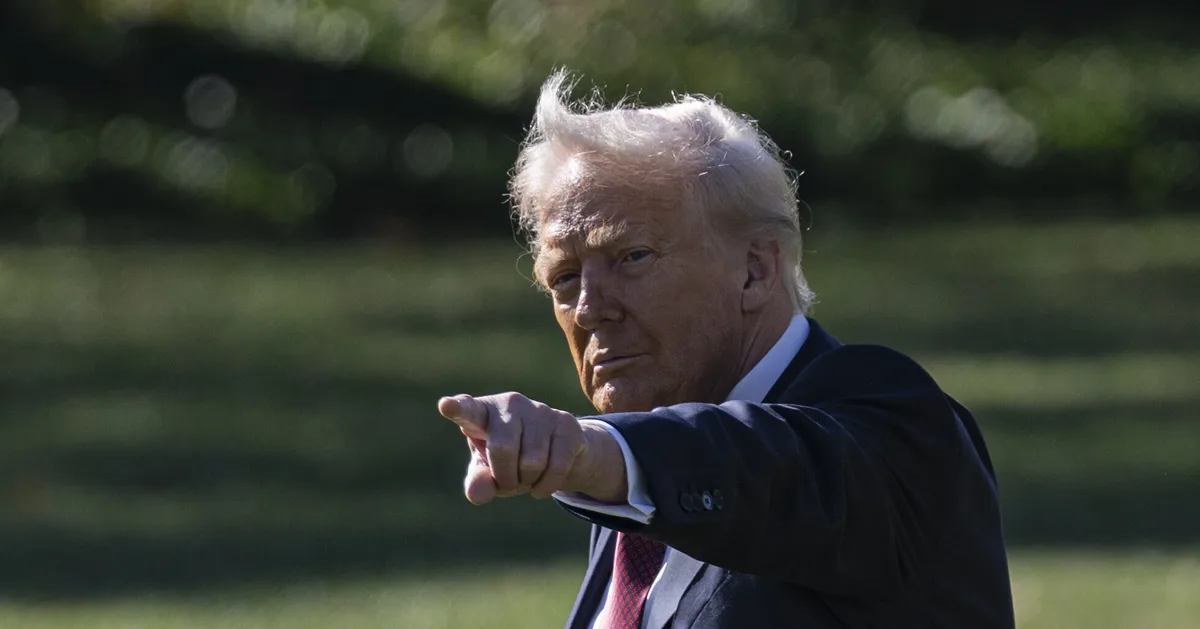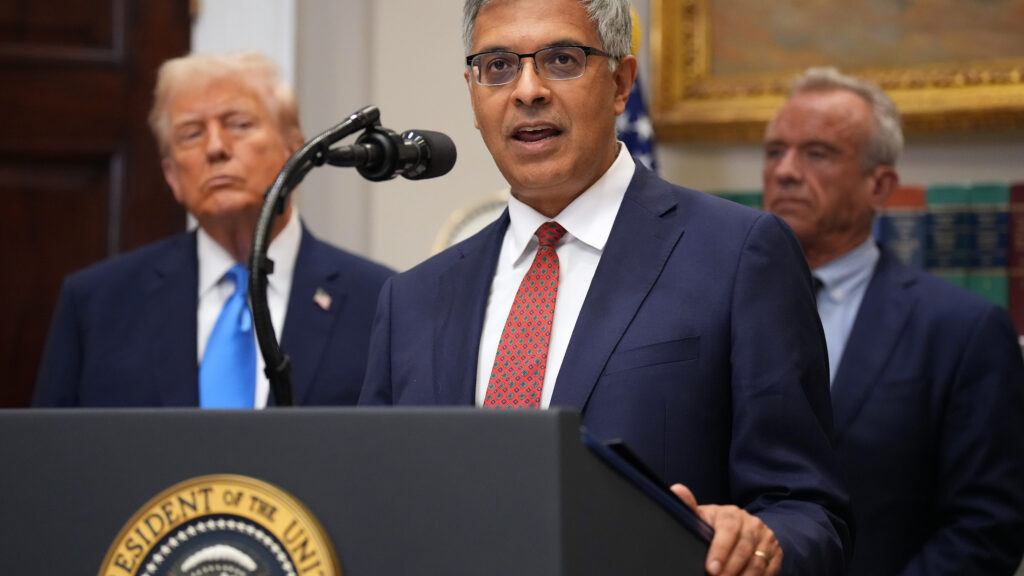Copyright HuffPost

LOADINGERROR LOADING It’s safe to say that President Donald Trump was not happy when he got wind of the results from election night. The president was already resuming his standard messaging in his remarks ahead of a breakfast with GOP senators on Wednesday morning. “They’re going to pack the court. They’re gonna make D.C. a state and they’re gonna make Puerto Rico a state,” Trump said of what Democrats would do if they see similar success in the midterms. “So now they pick up two states, four senators. They’re gonna pick up electoral votes. It’s gonna be a very, very bad situation.” Advertisement This messaging is nothing new for the president. So much of the rhetoric throughout both his campaigns and his time in office has hinged on the practice of defining that there is a clear “other” to his base — in this case, a “they” that can turn neighbors into this amorphous boogeyman that threatens their very way of life. Coming from the top down, the “Us vs. Them” mentality can stoke some additional fear and anger between community members who often want many of the same things (like being able to afford to live). Advertisement HuffPost reached out to some experts in both psychology and politics to get a better understanding of why this kind of rhetoric is so common in our current political environment — and the real, lived-in harm that comes from having it consistently coming from our leadership. How ‘us vs. them’ works — and who it really works for. “Basically, politicians who use ‘us’ vs. ‘them’ rhetoric are exploiting what cognitive and social psychologists call ‘in-group, out-group’ bias,” Aaron Montgomery, a clinical psychologist from Newport Beach, California, told HuffPost. He added that the concept comes from social identity research, “which finds that individuals are motivated to maintain a positive self-concept through group membership.” Ultimately, this means that we are more prone to identify with (and be open to working with) those who are part of our own in-group. We’re also more likely to view them “more favorably than those in the out-group (the group one is not a member of),” Montgomery explained. Advertisement This isn’t inherently terrible or particularly worrisome, he said, as it is a natural thing for humans to do. However, the more normal and easier-to-navigate biases can be exacerbated and “exploited with pathological results.” Particularly, when politicians employ this rhetorical tactic consistently. “A pathological version of this creates strong negative emotion (e.g., contempt, disgust and hatred) for those in the outgroup and, in an even more malignant form, can lead to dehumanization of members of the outgroup,” Montgomery said. “The effect is division, conflict and high negative emotions between groups and can lead individuals to feel justified in promoting and enacting various forms of maltreatment and discrimination against those in the out-group while extending privilege to those in one’s in-group.” This kind of mentality trickles down to our everyday lives in ways that don’t necessarily affect politicians. As HuffPost previously reported, mental health experts are already concerned that normalizing the divisive and toxic rhetoric coming from leadership can harm our communities IRL. And this kind of “us vs. them” language works in tandem with that to yield adverse outcomes for the real world we have to live in. “The impact on communities is negative, and leads to polarization and conflict. We look to our leaders to provide containment and safety,” Dr. Grant H. Brenner, a physician and psychiatrist in New York City, told HuffPost. “Leaders in the current climate fuel conflict as they seek to get more attention from their base,” Brenner continued. “This is fundamentally short-term thinking, and goes against both best practices in conflict resolution and crisis communications. Leaders should seek to reduce conflict and create dialogue, but instead — driven by short-term goals — they fuel splitting and projection of us-them thinking, pushing neighbors to be enemies and leading to splitting and fragmentation in communities.” Advertisement Elizabeth C. Connors, associate professor of political science at the University of South Carolina’s McCausland College of Arts and Sciences, noted that the “us vs. them” rhetoric, often stoking political anger, can easily yield the real-world consequences of political adversaries cutting ties entirely, citing research she and her co-authors published in the Journal of Politics in 2022. This can further “paralyze” politics and keep community members from being able to function together in meaningful ways. And, unsurprisingly, we end up in a lot of very angry stalemates. Why can’t we ditch this rhetoric? “Because, simply, it works,” Connors said. “Pitting the out-group against one’s in-group is incredibly effective as a motivator for action because people are naturally inclined to want their in-group to be successful and to see the out-group as distinct (and less than). This is true outside of partisan politics, but it is also very true in partisan politics.” Advertisement Not only does it work, Connors explained, but it might be especially useful to “elites” given just how much disdain, dislike and disapproval exists between two very polarized parties and “make every election, action, inaction, etc. a representation of that dislike.” “Unfortunately, though, if the ‘us vs. them’ approach is ‘working’ in that it’s getting people out to vote and work against the out-party, then elites will continue to use this strategic approach,” Connors added. “One hope is that individuals begin to reward more bipartisan (or less ‘us vs. them’) rhetoric, incentivizing elites to follow suit.” But is there a way out of this stalemate? It might start by learning to catch these knee-jerk in- and out-group responses and recognize them in ourselves as well as others. Advertisement “In psychology, we discuss the capacity for ‘mentalization’ and ‘intersubjectivity.’ Both of these terms refer to the capacity to think rationally, with good integration of intellect and emotions, so that we are able to hold multiple perspectives in mind without feeling pressure to agree or disagree,” Brenner explained. “The ability to do this is important for being able to work through conflict without devolving into splitting, projection and aggressive acting-out.” So if we are able to “mentalize,” he continued, we might be able to break out of the in-group/out-group division and get to a place where we can work together again. YourSupportMakes The Story Your SupportFuelsOur Mission Your SupportFuelsOur Mission Join Those Who Make It Possible HuffPost stands apart because we report for the people, not the powerful. Our journalism is fearless, inclusive, and unfiltered. Join the membership program and help strengthen news that puts people first. We remain committed to providing you with the unflinching, fact-based journalism everyone deserves. Thank you again for your support along the way. We’re truly grateful for readers like you! Your initial support helped get us here and bolstered our newsroom, which kept us strong during uncertain times. Now as we continue, we need your help more than ever. We hope you will join us once again. We remain committed to providing you with the unflinching, fact-based journalism everyone deserves. Thank you again for your support along the way. We’re truly grateful for readers like you! Your initial support helped get us here and bolstered our newsroom, which kept us strong during uncertain times. Now as we continue, we need your help more than ever. We hope you will join us once again. Support HuffPost Already a member? Log in to hide these messages. “This used to be shared wisdom — e pluribus unum — but has been seriously damaged in the last several election cycles, and recovery isn’t clear,” Brenner said. “We live in a dissociative age, more than an anxious one, where fragmentation and dis-integration, accelerated by misinformation and the above stresses, make it harder to solve problems together.”



